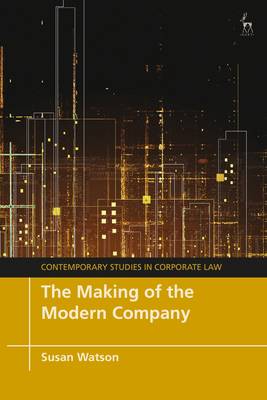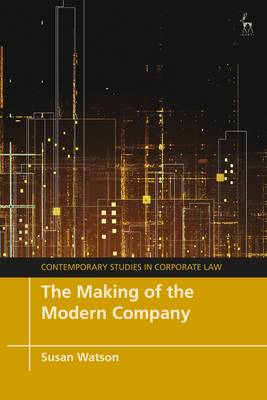
Bedankt voor het vertrouwen het afgelopen jaar! Om jou te bedanken bieden we GRATIS verzending (in België) aan op alles gedurende de hele maand januari.
- Afhalen na 1 uur in een winkel met voorraad
- In januari gratis thuislevering in België
- Ruim aanbod met 7 miljoen producten
Bedankt voor het vertrouwen het afgelopen jaar! Om jou te bedanken bieden we GRATIS verzending (in België) aan op alles gedurende de hele maand januari.
- Afhalen na 1 uur in een winkel met voorraad
- In januari gratis thuislevering in België
- Ruim aanbod met 7 miljoen producten
Zoeken
Omschrijving
This book adopts a historical perspective to highlight, and bring back into focus, the key features of the modern company. A central argument in the book is that legal personhood attaching to an entity containing a corporate fund seeded by shareholders is a direct and inevitable consequence of limited liability and the company's status as a separate legal entity from its shareholders. Management by a board subject to legal duties to the company as an entity that can exist in perpetuity facilitates a long term perspective by the board that can accommodate both shareholder and stakeholder interests. These defining characteristics differentiate the modern company from other business forms.
The Making of the Modern Company applies a 21st-century lens to the corporation through its history to identify turning points in its development. It sets out how key features emerged in the course of two separate developmental cycles in English corporate law: first with the English East India Company in the 17th century, and then with general incorporation statutes in the 2nd half of the 19th century. The book's historical perspective highlights that the key features are part of the 'secret sauce' of modern companies. Each cycle coincided with unparalleled periods of economic success associated with corporate activity
This book will be of interest to corporate law and governance academics, theorists and practitioners, those who study the company from related disciplines, and anyone who questions why uncertainty still exists about the structure of a legal form that has been described as 'amongst mankind's greatest inventions'.
The Making of the Modern Company applies a 21st-century lens to the corporation through its history to identify turning points in its development. It sets out how key features emerged in the course of two separate developmental cycles in English corporate law: first with the English East India Company in the 17th century, and then with general incorporation statutes in the 2nd half of the 19th century. The book's historical perspective highlights that the key features are part of the 'secret sauce' of modern companies. Each cycle coincided with unparalleled periods of economic success associated with corporate activity
This book will be of interest to corporate law and governance academics, theorists and practitioners, those who study the company from related disciplines, and anyone who questions why uncertainty still exists about the structure of a legal form that has been described as 'amongst mankind's greatest inventions'.
Specificaties
Betrokkenen
- Auteur(s):
- Uitgeverij:
Inhoud
- Aantal bladzijden:
- 384
- Taal:
- Engels
- Reeks:
Eigenschappen
- Productcode (EAN):
- 9781509959686
- Verschijningsdatum:
- 30/11/2023
- Uitvoering:
- Paperback
- Formaat:
- Trade paperback (VS)
- Afmetingen:
- 156 mm x 234 mm
- Gewicht:
- 471 g

Alleen bij Standaard Boekhandel
+ 199 punten op je klantenkaart van Standaard Boekhandel
Beoordelingen
We publiceren alleen reviews die voldoen aan de voorwaarden voor reviews. Bekijk onze voorwaarden voor reviews.









